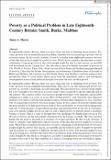Files in this item
Poverty as a political problem in late eighteenth-century Britain : Smith, Burke, Malthus
Item metadata
| dc.contributor.author | Harris, James A. | |
| dc.date.accessioned | 2023-03-23T15:30:02Z | |
| dc.date.available | 2023-03-23T15:30:02Z | |
| dc.date.issued | 2023-05-19 | |
| dc.identifier | 281145865 | |
| dc.identifier | 89058a64-965a-43f5-97c4-2fcb873ac521 | |
| dc.identifier | 85150909877 | |
| dc.identifier.citation | Harris , J A 2023 , ' Poverty as a political problem in late eighteenth-century Britain : Smith, Burke, Malthus ' , The Southern Journal of Philosophy , vol. 61 , no. 1 , pp. 63-81 . https://doi.org/10.1111/sjp.12501 | en |
| dc.identifier.issn | 0038-4283 | |
| dc.identifier.other | ORCID: /0000-0002-0333-3754/work/131588270 | |
| dc.identifier.uri | https://hdl.handle.net/10023/27249 | |
| dc.description.abstract | In eighteenth-century Britain, there was more than one way of thinking about poverty. For some, poverty was an essentially moral problem. Another way of conceiving of poverty was in economic terms. In this article, however, I want to consider some eighteenth-century versions of the idea that poverty might be a political issue. What I have in mind is the idea that a society containing a large proportion of very poor people might be, just for that reason, an unstable and disordered society. I argue, first, that this idea is central to Smith's treatment of poverty in The Wealth of Nations. Then, after a brief account of how Paine and Godwin imagined the end of poverty, I describe the further development and refinement of Smithian lines of thought in Burke and Malthus. My conclusion is that Smith, Burke, and Malthus constitute evidence that present-day ideas of social justice derive more from the nineteenth century and subsequent developments in moral and political thought than from the early modern period. | |
| dc.format.extent | 19 | |
| dc.format.extent | 157270 | |
| dc.language.iso | eng | |
| dc.relation.ispartof | The Southern Journal of Philosophy | en |
| dc.subject | B Philosophy (General) | en |
| dc.subject | T-NDAS | en |
| dc.subject | AC | en |
| dc.subject | MCC | en |
| dc.subject.lcc | B1 | en |
| dc.title | Poverty as a political problem in late eighteenth-century Britain : Smith, Burke, Malthus | en |
| dc.type | Journal article | en |
| dc.contributor.institution | University of St Andrews. School of Philosophical, Anthropological and Film Studies | en |
| dc.contributor.institution | University of St Andrews. St Andrews Institute of Intellectual History | en |
| dc.contributor.institution | University of St Andrews. Philosophy | en |
| dc.identifier.doi | 10.1111/sjp.12501 | |
| dc.description.status | Peer reviewed | en |
This item appears in the following Collection(s)
Items in the St Andrews Research Repository are protected by copyright, with all rights reserved, unless otherwise indicated.

